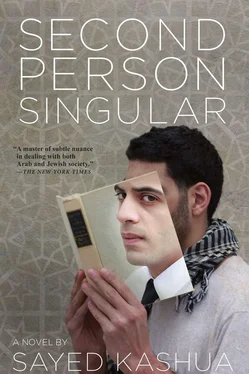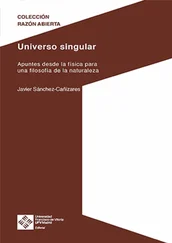Sometimes, after he went to sleep, I’d sit down at his desk, turn on the lamp, and leaf through his books and CDs. There was a big white yearbook that said Jerusalem High School for the Arts. Several years had passed since his picture was taken, but Yonatan hadn’t changed. He even had the same serious expression on his face. The big somber eyes that never really focused anywhere. The only difference was that in the picture he was standing on his feet and there was a camera hanging around his neck, held in his right hand. You could see that he had used his index finger to take a picture of himself in the mirror. Under the picture, in a sloping sprawl, it said, Yonatan, we looked everywhere, but couldn’t find a better photographer to take your picture. Stay safe and good luck taking pictures for the army, you jobnik. Lots of love! P.S. Don’t be so serious all the time — it’s okay to smile for the camera every once in a while.
Sometimes I’d sit at his desk and halfway expect to find him leaning over my shoulder, looking down at me as I touched his things. It seemed to me that he was completely capable of getting up and that he was deceiving everyone, lying in bed, aware of everything, not actually felled by infirmity. His body bore no sign of illness, no scratch or scar that spoke of an accident. He looked exactly like the picture in the yearbook on the shelf.
The main problem up in the attic was figuring out how to pass the time from when Yonatan fell asleep till I got tired enough to go to bed. I’d try my mother’s technique, shutting my eyes and initiating yawns, but I was never able to go to sleep before midnight. I had five hours to burn in that attic. After getting the okay from Osnat, I started listening to Yonatan’s music. Aside from the stereo he also had a separate CD player with small Sony earphones. “I don’t know if you’ll like his music, though,” she said, “he has really weird taste.”
I didn’t know any of the albums that he had, so I decided to start from the top of the stack and work my way down. At first it had nothing to do with enjoyment; I listened to Yonatan’s music in order to pass the time. I sat on the couch, opposite Yonatan, with an album cover in my hands and listened, trying to remember the name of the band and the song. When the album cover came with the lyrics, I tried to read along. Osnat was right — he really did have weird taste. The music he liked was nothing like what I had listened to up until then, and I don’t mean Wassim’s and Majdi’s music or the Egyptian pop my dorm mate used to play. His CDs were nothing like what I used to hear over the radio on the Israeli buses, either.
The first album I listened to was by a band called Sonic Youth and their songs, the first time around, sounded like they’d been recorded in a carpenter’s workshop. But I listened to it all the way through, and then again, and then I felt tired and was able to fall asleep.
SPOON, LEMON WEDGE, LIGHTER
Walid didn’t waste any time getting Leila an active case and he asked me to accompany her on her first house call, to the Old City. At the time the Old City was one of the main drug centers in Jerusalem. All by itself it could have kept two outpatient clinics in business, but no one wanted to work there and only a few of the addicts actually wanted anything aside from their income support.
Leila showed up on time, at exactly eight thirty, half an hour after me. I tried to cover the awkwardness by rifling through the paperwork and shoving a sheaf of papers that I hadn’t really looked at into a folder. I kept my head down and said, “Okay, if you’re ready to go, we should head out.”
I knew I felt something when I was with Leila. I didn’t know if it was the same tension and shyness that I felt around all Arab girls or if it was something different. Either way, I tried to stifle it. I didn’t want to be like all those other men I knew, drooling over every woman they saw. That’s not who I am, girls don’t even really interest me, I told myself, and I knew that it was precisely the other way around.
“You’re walking too fast,” Leila said. “We’re not late, are we?”
“Sorry,” I said, turning around. I hesitated for a moment, my eyes focusing in the general vicinity of her face, and then looked her straight in the eye. I blushed and felt my face burn and hated myself for it, wanting to run away.
“You’re so shy,” Leila said, smiling.
Where the hell did she get that from? I thought to myself. But I liked it. I saw it as a kind of understanding, a sense of trust, a lack of fear. Sometimes, when I heard my colleagues or even Majdi talk about girls, I was sure that if I was a girl I would be terrified of every man in the world. I walked slower, but still one step ahead of Leila so that no one would think we were together. I could’ve led us through the side streets and alleys that link Wadi Joz to the Old City but I chose to take the main road so that there’d be witnesses, so that we wouldn’t be alone. We got to Salah al-Din Street and from there to Musrara. I tried walking slowly, at her pace. As we prepared to cross the street from Musrara to Damascus Gate, we stood close to one another and she said, “You’re different from all of the rest of the guys in the office.”
I crossed the street fast and Leila ran after me.
There were faces that I recognized at the entrance to Damascus Gate but I lowered my gaze and ignored them. Some of them were selling toys and perfume and others were just leaning against the stone walls. As we entered the Old City, I drew close to Leila and said, in a professional whisper, “Damascus Gate is one of the biggest drug-dealing zones in the city.” It was a Wednesday, still early in the morning, and the foot traffic in the market was thin.
“How long will it take us to get there?” she asked, looking at her watch.
“Five minutes.”
“Then we have some time,” she said. “Do you think we could go to Lina? I haven’t been there in a long time.”
Lina’s ground-floor seating area was full. The waiter pointed us upstairs and we found a table for two. I shouldn’t have agreed to this, I thought. Leila flashed her smile, which I saw out of the corner of my eye. For some reason it seemed to me that I was making her laugh. The big city girl from the Galilee must’ve thought that I was a walking stereotype from a small village in the Triangle: the kind of guy who is embarrassed by the presence of girls. After all, she didn’t know how they talked behind her back. I still remember a joke about a guy from the Triangle who asks a Christian girl from the Galilee if she’d like to dance, and she says, “Your name’s Muhammad, you’re from the Triangle, and you want to dance with me?” For some reason I was sure that Leila was a Christian, even though, as opposed to the other Christian students I had met, she did not wear a cross. Many of the Christian students wore one over their clothes, displaying it so that everyone would know: I’m not a Muslim, not really an Arab.
We both ordered our hummus plain, no chickpeas, no fava beans. “Mmm, I love Lina,” Leila said, scooping the hummus out of her bowl with a pita. I watched her hands work: she was not one of those girls who patted some hummus on a pita with a fork. She held the pita and she shoveled the hummus into her mouth. Holding an onion wedge, she asked “Do you mind?” and took a big bite. “What are you doing?” she asked. “Why aren’t you eating?”
“I’m not hungry,” I lied. The truth is I didn’t eat because it seemed to me at that moment that it was embarrassing, beastly, the kind of thing that should be done alone, behind closed doors. Definitely not in front of a girl and definitely not in front of a girl for whom I already knew I felt something, despite my best efforts to keep that feeling at bay.
Читать дальше












